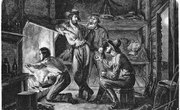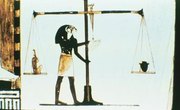Arthur Miller's "All My Sons," like "Death of a Salesman," creates modern tragedy from Aristotle's Greek template. It depicts a protagonist with the flaw of hubris -- god-defying pride -- and his nemesis -- long-delayed destruction -- leading to catharsis -- emotional release. Its themes include social responsibility, denial and the corruption of the American Dream.
Joe Keller and the Theme of Hubris
The play is set in "an American town" post-WWII, after the trial and exoneration of Joe Keller, who manufactured faulty airplane parts and sent 21 fliers to their deaths, but blamed his business partner. Keller -- in self-denial that rivals that of Creon in "Antigone" -- confesses to his son Chris that he did it "for the family" because "nothin' is bigger"; he also rationalizes that everyone is corrupt: "half the goddamn country is gotta go if I gotta go."
Chris Keller as Nemesis
Having established Joe's hubris, Miller creates an ironic nemesis in Chris. The son idolizes his father, but rejects him when he learns the truth, and speaks of social accountability: "there's a universe outside and you're responsible to it." He also rejects the American Dream: "this is the land of the great big dogs, you don't love a man, you eat him!" Chris is the logical punishing force for Joe, since his mother is in complete denial as to her husband's guilt -- it falls to the son to destroy the father.
Deus Ex Machina, a Letter
A "deus ex machina" is an unexpected device -- an inheritance, a revelation, a new character -- that the Greeks used to expedite a tragedy's ending. In "All My Sons,"' the device is a letter from Joe's other son, Larry, announcing his shame at his father and his intention to commit suicide. Joe, hit with this news, shoots himself, and Miller's play achieves catharsis as the insulated, self-serving circle of the family is shattered.
Irony Caps the Tragedy
Miller saturates his Greek tragedy with irony. The protagonist is not a great hero with lofty ambitions, but a racketeering thug with a family fixation; the nemesis is not an avenging god, but the son who adores the father. The surrounding characters are not wise Greek chorus members, but foolish Americans in prosperous denial. Miller's achievement was to normalize tragedy into the stuff of everyday lives.
Related Articles
Writer Bio
Michael Stratford is a National Board-certified and Single Subject Credentialed teacher with a Master of Science in educational rehabilitation (University of Montana, 1995). He has taught English at the 6-12 level for more than 20 years. He has written extensively in literary criticism, student writing syllabi and numerous classroom educational paradigms.











